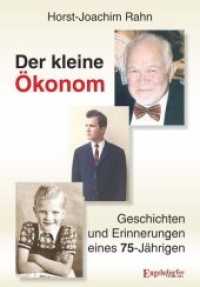- ホーム
- > 洋書
- > 英文書
- > Computer / General
Full Description
This uniquely inspirational and practical book explores human simulation, which is the application of computational modeling and simulation to research subjects in the humanities disciplines. It delves into the fascinating process of collaboration among experts who usually don't have much to do with one another - computer engineers and humanities scholars - from the perspective of the humanities scholars. It also explains the process of developing models and simulations in these interdisciplinary teams.
Each chapter takes the reader on a journey, presenting a specific theory about the human condition, a model of that theory, discussion of its implementation, analysis of its results, and an account of the collaborative experience. Contributing authors with different fields of expertise share how each model was validated, discuss relevant datasets, explain development strategies, and frankly discuss the ups and downs of the process of collaborative development. Readers are given access to the models and will also gain new perspectives from the authors' findings, experiences, and recommendations.
Today we are in the early phases of an information revolution, combining access to vast computing resources, large amounts of human data through social media, and an unprecedented richness of methods and tools to capture, analyze, explore, and test hypotheses and theories of all kinds. Thus, this book's insights will be valuable not only to students and scholars of humanities subjects, but also to the general reader and researchers from other disciplines who are intrigued by the expansion of the information revolution all the way into the humanities departments of modern universities.
Contents
Chapter 1. Introduction.- Chapter 2. Refugee studies (Erika Frydenlund).- Chapter 3. MODRN post-doc, integration model (Carlos Lemos).- Chapter 4. Sociologist, demographic model (David Voas).- Chapter 5. Philosophy, cognitive science model (Bob McCauley).- Chapter 6. Religious studies, cognitive science model (Ann Taves).- Chapter 7. Early Christian studies Model (Colleen Shantz).- Chapter 8. Philosopher, empathy studies (John Teehan).- Chapter 9. Psychologist, language acquisition model (Catherine Caldwell-Harris).- Chapter 10. Anthropologist (Rich Sosis).- Chapter 11. Archaeologist, neolithic exert (Dorien Fuller).- Chapter1 2. Computer science archaeologist (Nicolo dell'Unto).- Chapter 13. Cognitive Science of Religion (Justin Lane).- Chapter 14. Conclusion.








